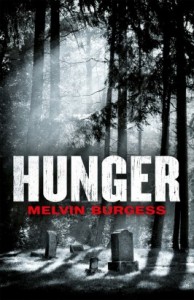By Melvin Burgess
Published by Hammer
ISBN: 978-0099576648
You may remember that recently Halinka Orszulok reviewed the first of the new Hammer novellas, The Daylight Gate by Jeanette Winterson. Hunger by Melvin Burgess is another in the same series. It’s a fine artefact of a book, hardcovered and dust-jacketed. From the blurb it sounds intriguing. A shame then, that it’s actually rubbish.
I don’t know Melvin Burgess’s work but he has a good reputation of writing YA fiction where the characters do controversial things like have sex and take drugs. Which is great, because that’s exactly what young people do and I’m glad Burgess tackles those things and it sounds like he does a great job of it. But he does a terrible job of horror.
The book annoyed me from the outset. It starts with a Prologue of about a page and half. Then Chapter 1 follows exactly after the events of the prologue – there’s not even a scene break. Why the hell is that a prologue? It’s the first page and a half of Chapter 1.
So a pointless prologue had me off-side, but it was a cool idea of young Beth waking up covered in dirt with no recollection of where she had been or why she was so grubby. It’s a really cool opening premise in which Burgess really ramps up the tension. The trouble is, it seems like all he really had was that great opening idea and he just phones in the rest of the story from there on.
There is some great writing, but so much of the book is like a first draft. It feels rushed, like Burgess was working to a terrible deadline and all the editors were on holiday. There are several jarring switches of point of view in mid-page, where we jump from one character’s head to another, sometimes mid-paragraph. Then there are dodgy omniscient narrator moments, where the flow is broken by the author jumping in and out with things the characters couldn’t know. This is just simple bad writing. It could all have been tidied up with good editing.
Without giving away too much of the story (though I don’t recommend you read this anyway) Beth’s troubles stem from her connection to a particularly nasty demon and his ghoulish assistants, who come and go through the book. There are some great ideas at work here, but they’re ruined by some ridiculous, almost comical, action scenes. And if they’re not comical, they’re non-sensical. Like the bit where the kids are thoroughly beaten by the demon and his monster – the beast is literally sitting on top of Beth – then they run away for no reason, leaving Beth and her friends to fight on another day.
Then there are moments when mad, slavering beasts are running around and jumping on cars in broad daylight, but luckily no one seems to be around to notice. Seriously, you could be forgiven for thinking that Beth and her friends live in a world where there are no people whatsoever except for themselves and a handful of secondary characters vaguely relevant to the story.
There’s no talk of missed uni classes or explanations of strange absences. For that matter, there’s no real continuation of fear. These kids are literally being hunted by a demon and his various beasts, and they act scared for a moment here and there, then they sit around and have a laugh and a joke with pizza and a movie. At one point they all go out and get pissed just for a laugh. And that in itself leads to another absurd encounter in one of the few scenes where other people are plainly evident, right up until there’s something weird they might spot. Then no one is around. Anywhere. At all.
So, sadly, after a great opening and a really good build of initial tension, utter nonsense ensues for nearly 300 pages.
There’s even a bit towards the end where one big beastie (who has been in the fray since nearly the beginning) is all rabid and deadly in the final scene, then suddenly in the ground and immobilised and we’ve had no mention at all of how he was beaten. None at all.
I really wanted to like this book and it could have been far more interesting if it had been better written and better edited, but by the two thirds mark I was only ploughing through to the end for a sense of closure, and because it’s quite short anyway.
Rubbish.
.











